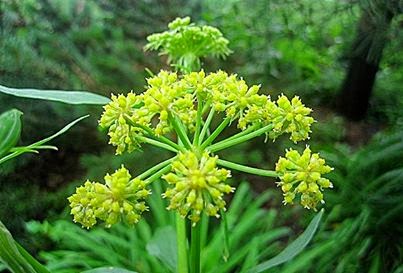LOVAGE
The other common names for the herb lovage are love parsley, sea parsley, lavose, liveche, smallage, European lovage, common lovage, Cornish lovage, English lovage, Italian lovage, maggi plant and old English lovage.
Lovage is a herb which belongs to the Apiaceae family derived its name from the Latin word denoting ‘Ligurian’ which was thrived from Liguria a province that comprises the Italian Riviera.Lovage came to America with the English colonists and was brought over for both food and medicine. The name entered English in Chaucer’s Day as ‘love-ache’ or ‘love parsley’. The name lovage is for the only fact that breath sweeteners prepared with lovage may stimulate romance. Thus this old English herb that was formerly very generally cultivated, and is still occasionally cultivated as a sweet herb and for the use in herbal medicine of its root, and to a less degree, the leaves and seeds. The herb has a peculiar name Baldmoney,' which is said to be a corruption of Balder, the Apollo of the northern nations, to whom the plant was dedicated.
Lovage is a hardy perennial herb, with ribbed stalks and hollow stems that divide into branches near the top. The thick, erect hollow and channelled stems grow 3 or 4 feet or even more in height. The stems bear umbels of yellow flowers about 30 mm across similar to those of Fennel or Parsnip. Leaves are dark green, opposite, compound, leaflets wedge shaped maybe toothed or ridged. Lovage has a strong taste and odour.Their surface is shining, and when bruised they give out an aromatic odour, somewhat reminiscent both of Angelica and Celery. The elongated root is crowned with fibres, which is about5 or 6 inches long and they have a nutty flavour.The fruits are extremely aromatic yellowish-brown in colour, elliptical in shape and curved, with three prominent winged ribs. The whole plant has a pleasant aromatic smell.
The roots, leaves and seeds are used for its medicinal purposes and the young stems for flavouring and confectioner
Lovage is a herb which belongs to the Apiaceae family derived its name from the Latin word denoting ‘Ligurian’ which was thrived from Liguria a province that comprises the Italian Riviera.Lovage came to America with the English colonists and was brought over for both food and medicine. The name entered English in Chaucer’s Day as ‘love-ache’ or ‘love parsley’. The name lovage is for the only fact that breath sweeteners prepared with lovage may stimulate romance. Thus this old English herb that was formerly very generally cultivated, and is still occasionally cultivated as a sweet herb and for the use in herbal medicine of its root, and to a less degree, the leaves and seeds. The herb has a peculiar name Baldmoney,' which is said to be a corruption of Balder, the Apollo of the northern nations, to whom the plant was dedicated.
Lovage is a hardy perennial herb, with ribbed stalks and hollow stems that divide into branches near the top. The thick, erect hollow and channelled stems grow 3 or 4 feet or even more in height. The stems bear umbels of yellow flowers about 30 mm across similar to those of Fennel or Parsnip. Leaves are dark green, opposite, compound, leaflets wedge shaped maybe toothed or ridged. Lovage has a strong taste and odour.Their surface is shining, and when bruised they give out an aromatic odour, somewhat reminiscent both of Angelica and Celery. The elongated root is crowned with fibres, which is about5 or 6 inches long and they have a nutty flavour.The fruits are extremely aromatic yellowish-brown in colour, elliptical in shape and curved, with three prominent winged ribs. The whole plant has a pleasant aromatic smell.
The roots, leaves and seeds are used for its medicinal purposes and the young stems for flavouring and confectioner

0 comments:
Post a Comment